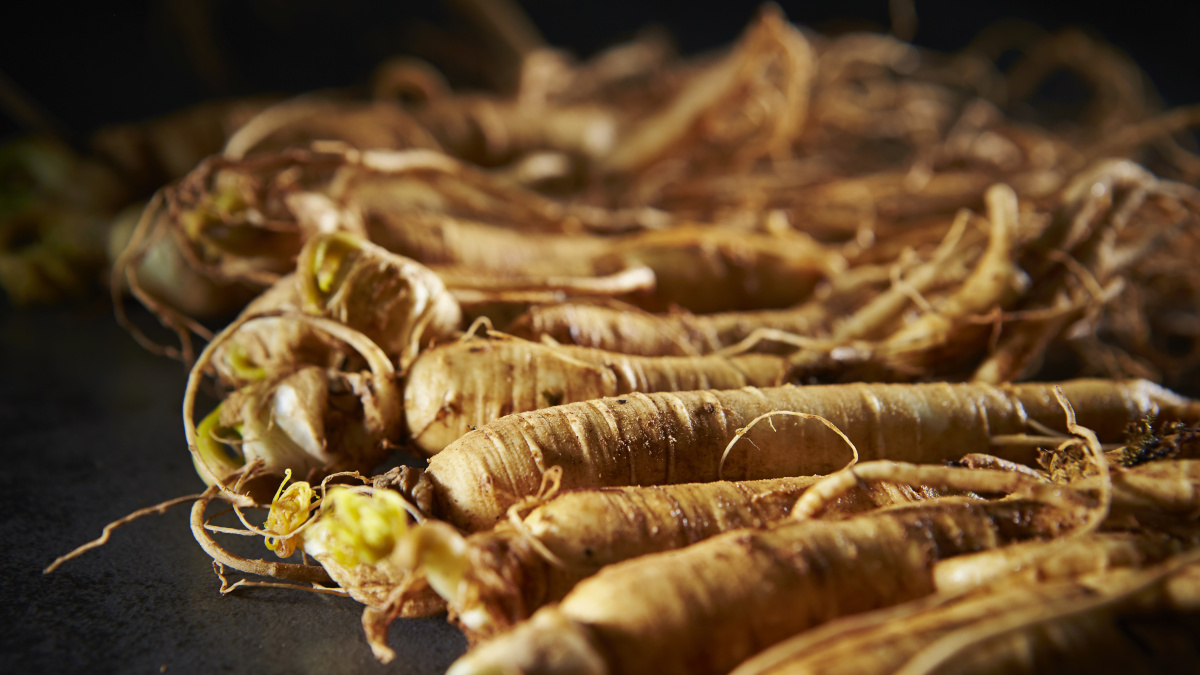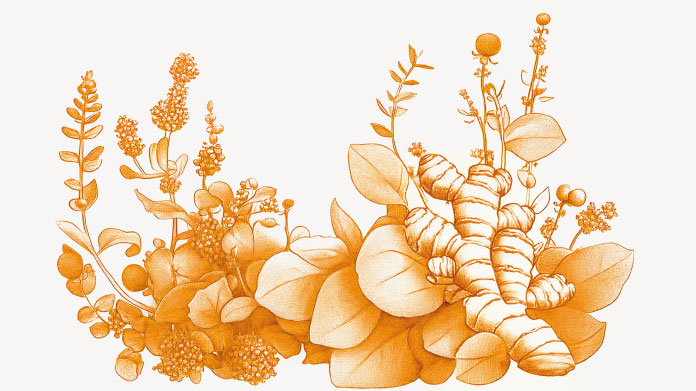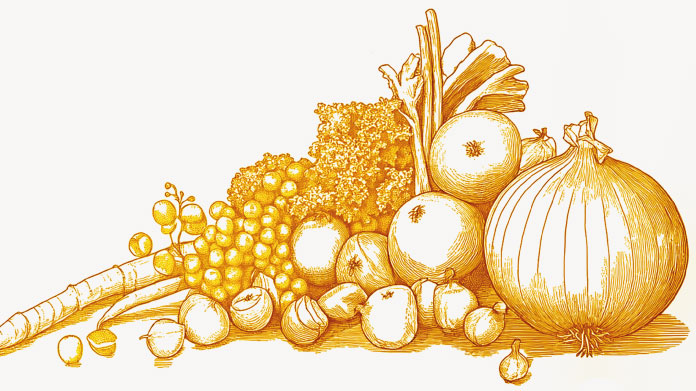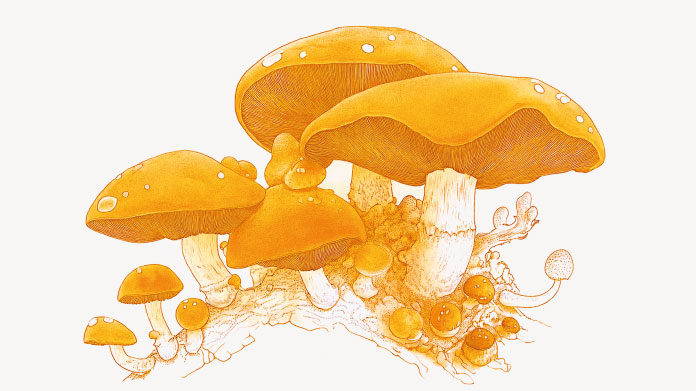Ginseng: the amazing root that helps to support immunity and cognition
We’ve all heard of ginseng, the no. 1 ingredient in the Asian pharmacopoeia. But how is the word pronounced, what are the many health benefits associated with this plant and what accounts for them?

Ginseng, also known as Panax ginseng (or the ‘universal remedy’)
Ginseng is a perennial plant from the Araliaceae family, native to China and Korea. It is usually between 30 and 50 cms in length and is recognisable by its whiteish flowers and small red berries.
Its scientific name is Panax ginseng, Panax meaning “all-healing” in Greek. Ginseng (which means “man-root” in Mandarin) is pronounced with a ‘soft g’ as in ‘jinseng’.
In Korea, it is usually known as insam, meaning “man-shaped root“. After a few years’ growth, ginseng root can indeed come to resemble a human body with two arms and legs ...
The favorite plant of Chinese emperors
An essential ingredient of the Asian pharmacopoeia, ginseng root (or rhizome) has a very long history of use - as much as 4000+ years. Practitioners of Chinese medicine have always considered ginseng to be a Qi tonic (“vital energy»).
Chinese emperors, noblemen and the Imperial guards in particular, benefited from its many medicinal properties. From the 18th century onwards, ginseng root was also available in the West, where it was used as a pick-me-up, aphrodisiac and stimulant.
Ginseng’s benefits for immunity, cognition and vitality
A plant recognized for its multiple benefits, ginseng helps to maintain:
- the immune system (1-2) ;
- good cognitive performance. It plays a role in maintaining normal circulation which is associated with healthy brain reactivity and performance. It thus supports optimal mental and cognitive activity, and in particular, memory (3-4) ;
- normal blood sugar levels, as part of a healthy lifestyle (5) ;
- a healthy sex life (6) ;
- vitality and attention, by combatting fatigue. Ginseng helps to maintain physical and mental capacity in cases of weakness, exhaustion, fatigue and loss of concentration (7-8).
Its exceptional properties have made ginseng root a natural choice for formulation into a dietary supplement. Ideally, opt for a supplement such as Ginseng 30%, known for its high content of active ingredients (30% ginsenosides).
What is responsible for ginseng root’s medicinal properties?
Ginseng’s diverse benefits are the result of its content in:
- ginsenosides, saponosides with a steroid-like structure, also known as ‘panaxosides’. As the main active ingredients in ginseng, ginsenosides may, in particular, help to regulate several ion channels of the central nervous system. Once digested, the molecules generated by ginsenosides may also promote interaction between dendritic cells and T lymphocytes. It’s worth noting that ginseng is the one and only source of ginsenosides (9) ;
- triterpenoids (including protopanaxadiol) ;
- essential oil with monoterpenes ;
- fatty acids ;
- polysaccharides ;
- sterols ;
- vitamins (B, C and E) ;
- and minerals (magnesium, potassium, calcium...)
How to obtain maximum benefit from ginseng
Ginseng is best taken in the morning because of its stimulant effect. You should not exceed 2g (2000mg) a day. We recommend taking ginseng for no longer than 3 months in succession. If you want to extend the supplementation period, take a one-week break every 3 weeks.
If you suffer fromhypertension, heart problems or are taking anticoagulants, please consult your doctor before starting a course of ginseng supplements.
Some synergistic supplements
Other dietary supplements that can be taken in combination with ginseng include:
- zinc, an essential trace-element which supports normal immune system and cognitive function (Zinc Orotate) ;
- reishi, the benefits of which were also enjoyed by Chinese emperors. This “ mushroom of immortality” helps to maintain healthy circulation (opt for the excellent Reishi Extract, standardized to 20% polysaccharides and 6% triterpenes) ;
- and maca, an aphrodisiac plant known as “Peruvian ginseng”. Maca is recognized for helping to stimulate sexual desire (Super Maca).
References
- Wee JJ, Mee Park K, Chung AS. Biological Activities of Ginseng and Its Application to Human Health. In: Benzie IFF, Wachtel-Galor S, editors. Herbal Medicine: Biomolecular and Clinical Aspects. 2nd edition. Boca Raton (FL): CRC Press/Taylor & Francis; 2011. Chapter 8. Available from: https://www.ncbi.nlm.nih.gov/books/NBK92776/
- Kang S, Min H. Ginseng, the 'Immunity Boost': The Effects of Panax ginseng on Immune System. J Ginseng Res. 2012;36(4):354-368. doi:10.5142/jgr.2012.36.4.354
- Kim HJ, Kim P, Shin CY. A comprehensive review of the therapeutic and pharmacological effects of ginseng and ginsenosides in central nervous system. J Ginseng Res. 2013;37(1):8-29. doi:10.5142/jgr.2013.37.8
- Park KC, Jin H, Zheng R, et al. Cognition enhancing effect of panax ginseng in Korean volunteers with mild cognitive impairment: a randomized, double-blind, placebo-controlled clinical trial. Transl Clin Pharmacol. 2019;27(3):92-97. doi:10.12793/tcp.2019.27.3.92
- Chen W, Balan P, Popovich DG. Review of Ginseng Anti-Diabetic Studies. Molecules. 2019;24(24):4501. Published 2019 Dec 9. doi:10.3390/molecules24244501
- Leung KW, Wong AS. Ginseng and male reproductive function. Spermatogenesis. 2013;3(3):e26391. doi:10.4161/spmg.26391
- Wee JJ, Mee Park K, Chung AS. Biological Activities of Ginseng and Its Application to Human Health. In: Benzie IFF, Wachtel-Galor S, editors. Herbal Medicine: Biomolecular and Clinical Aspects. 2nd edition. Boca Raton (FL): CRC Press/Taylor & Francis; 2011. Chapter 8. Available from: https://www.ncbi.nlm.nih.gov/books/NBK92776/
- EFSA Register of Questions - Europa EU
- Kiefer D, Pantuso T. Panax ginseng. Am Fam Physician. 2003 Oct 15;68(8):1539-42. PMID: 14596440.
Keywords
6 Hours
Easy to navigate site
Easy to navigate site, had what I was searching for, good price. easy order-check out
James Tucker
6 Days
My skin is clearing up nicely!
Pretty good for my skin so far.
Christian
8 Days
The new packaging is excellent
The new packaging is excellent - finally! No more squashed boxes and torn envelopes.
GORAN
9 Days
Great Product
Great Product
Larry Garrett
13 Days
Quick shipping
Quick shipping; good price. No issues!
Mary McCarty
15 Days
Thr product is very good and is helping…
Thr product is very good and is helping me on my health. Then is always on time
LUGO Luz
17 Days
Buying was fine
Buying was fine. I had problems with the website not recognizing my login info, and had to call to get it fixed. Other than that, everything was good.
David S. Clark
17 Days
Your super maca and super ginseng are…phenomenal
Your super maca and super ginseng are phenomenal supplements that compliment each other when taking them together. Fantastic feeling of well-being and lots of mid day energy without the crash.
Keith Mason
20 Days
I have had amazing results with every…
I have had amazing results with every supplement I've purchased. I am extremely satisfied with this company
kirstin Torres
20 Days
Fine products
Fine products . They are on the leading edge of online supplements. The only issue -so far-is they sometime run out of subscription items.
Jason Argos
23 Days
The ordering process is very user…
The ordering process is very user friendly and the products always come in a timely manner.
CARTER Rhonda
24 Days
The price for Dr
The price for Dr. Pero's AC-11 is reasonable and in line with his views. (my former colleague). Keep it pure.
CAMPBELL Clayton
27 Days
Right on every time.
Right on every time.
Arthur Nicholas
30 Days
They are cheaper than everyone else and…
They are cheaper than everyone else and the shipping was fast. Great company.
Patricia Adams
36 Days
Availability of quality health…
Availability of quality health supplements and it's wide variety is impressive. Ordering is seamless and shipping even during the holidays is well streamlined.
Mohamad Hussein




